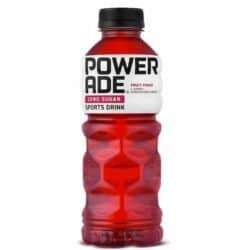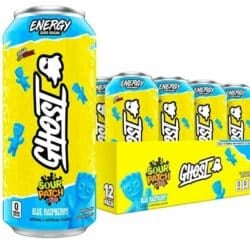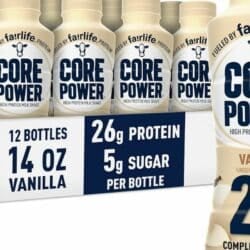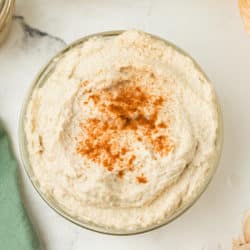Is Fresca Good For You (Nutrition Pros and Cons)?
In this blog post, I’ll review whether Fresca is good for you or not? Find out this product’s nutrition pros and cons, plus some better options to consider. In general, Fresca is a better option than most soft drinks but not as good as plain water.

Fresca Facts
Fresca, a citrus-flavored carbonated beverage, is owned by The Coca-Cola Company.
In 1966, Coca-Cola introduced Fresca as an alternative to traditional sodas. Currently, the company markets Fresca as a sugar-free, zero-calorie, caffeine-free beverage for health-conscious consumers.
Fresca is a sparkling, citrus-flavored drink available in 12-fl oz cans. In addition to its original Citrus flavor, it is also available in various other flavors, including Peach, Black Cherry, and Grapefruit Citrus.
Depending on the flavor, Fresca contains various ingredients, such as:
- Carbonated water
- Citric acid
- Natural flavors
- Potassium citrate
- Concentrated grapefruit juice
- Aspartame
- Potassium sorbate (to protect taste)
- Acesulfame potassium
- Acacia gum
- Potassium benzoate (to protect taste)
- Glycerol ester of rosin
- Calcium disodium EDTA (to protect taste)
- Carob bean gum
One serving of Fresca is a 12 fl oz. can. Each serving of a can of Fresca contains 35 mg of sodium, zero sugar, zero calories, and no caffeine.
Fresca Ingredients
Let’s explore some of Fresca’s main ingredients and whether they can affect your health.
Potassium Citrate
Potassium citrate is a compound often used in dietary supplements and medications for its health benefits, particularly in managing certain medical conditions.
It effectively prevents and treats kidney stones by alkalizing the urine, which helps reduce the formation of these stones.
However, excessive intake of potassium citrate can lead to health problems, such as hyperkalemia, characterized by dangerously high potassium levels in the blood. This condition can cause symptoms like muscle weakness and irregular heartbeats and, in severe cases, can be life-threatening.
Therefore, while potassium citrate can be beneficial for some people , but there are potential health risks which would make Fresca bad for you.
Potassium Benzoate
Potassium benzoate is a preservative commonly used in food and beverage products to inhibit the growth of mold, yeast, and bacteria, thereby extending the shelf life and ensuring product safety. However, there are health concerns associated with potassium benzoate.
Some people experience side effects including allergic reactions or sensitivities, manifesting as skin rashes, asthma, or other respiratory issues.
While potassium benzoate is effective for food preservation, consuming it within recommended limits and being mindful of potential interactions and personal sensitivities is essential.
Potassium Sorbate
Potassium sorbate is yet another widely used food preservative that helps prevent food spoilage, reducing the risk of foodborne illnesses.
Approved as safe by regulatory agencies like the FDA in the United States, potassium sorbate may not cause serious health problems if consumed in small amounts. However, excessive intake or sensitivity to potassium sorbate may lead to allergic reactions, including skin rashes, itching, and digestive issues in some people.
Even though scientific evidence linking potassium sorbate to adverse health effects remains limited and inconclusive, there are concerns about health risks associated with long-term consumption of this preservative.
As with any food additive, it is advisable to consume potassium sorbate in moderation and be mindful of personal sensitivities to minimize potential health risks.
Natural Flavors
Food containing “natural flavors” can present several challenges and uncertainties for consumers. Unlike terms such as “organic” or “non-GMO,” which have specific regulatory definitions, “natural flavors” lacks a standardized definition or transparency in labeling.
This ambiguity allows manufacturers to use a wide range of additives and extracts under the umbrella term “natural flavors,” including substances that undergo significant processing or are derived from natural sources but altered with chemical processes.
Individuals with specific dietary restrictions or allergies may find it difficult to ascertain the exact ingredients or potential allergens in products labeled with “natural flavors.” The term does not guarantee nutritional value or health benefits, as these additives may still contribute to processed foods’ overall sugar, sodium, or calorie content.
Unless the company website or product label clearly states it, consumers seeking to make informed choices about their diet may face challenges in understanding the true composition and health implications of products labeled with “natural flavors.”
Calcium Disodium EDTA
Calcium Disodium EDTA, or ethylenediaminetetraacetic acid, is a chelating agent commonly used as a preservative and stabilizer in processed foods, beverages, and personal care products.
One of its primary health benefits is its ability to bind with metal ions, such as lead and cadmium, in the body, thereby aiding in their removal and reducing potential toxic effects. This makes it valuable in food preservation, where it helps maintain product freshness and stability by preventing oxidation and discoloration.
However, there are concerns about the safety of Calcium Disodium EDTA, particularly regarding its potential to chelate essential minerals like calcium, magnesium, and zinc from the body when consumed in large amounts. This could lead to nutrient deficiencies over time.
Additionally, some people experience mild digestive disturbances or allergic reactions to EDTA. It’s best to avoid this additive or consume it in moderation.
Aspartame
Aspartame is an artificial sweetener. Food product manufacturers commonly use it as a sugar substitute in various low-calorie and sugar-free foods and beverages. It provides sweetness without the calories associated with sugar, which can be helpful for weight management.
However, aspartame has been the subject of extensive debate and research regarding its safety.
Some scientific studies suggest potential links between aspartame consumption and adverse health effects, including headaches, dizziness, and gastrointestinal issues.
Additionally, individuals with phenylketonuria (PKU), a genetic disorder, must avoid aspartame because it contains phenylalanine, which they cannot metabolize.
Despite these concerns, regulatory agencies like the FDA and the EFSA (European Food Safety Authority) have reviewed the evidence and maintained that aspartame is safe for the general population when consumed within established acceptable daily intake levels.
As with any additive, it’s best to avoid it or, at the very least, consume it in moderation.
Nutrition Pros
Fresca drinks are calorie-free beverages, which makes them attractive to those watching their calorie intake or managing their weight. It’s a refreshing drink that is certainly better for you than a soft drink with added sugar or diet sodas like Diet Coke.
Additionally, these sodas are convenient and hydrating, providing a refreshing way to quench thirst without added sugars.
Nutrition Cons
Fresca drinks have several nutritional cons that health-conscious people should consider.
One significant concern is the presence of artificial sweeteners like aspartame, which provide sweetness without calories. Aspartame has been the subject of debate regarding potential health risks, including links to headaches and digestive issues in some people.
Additionally, Fresca contains preservatives such as potassium benzoate and potassium sorbate, which help extend shelf life but may have adverse health effects if consumed in excess. These preservatives are associated with allergic reactions, and there are concerns about their potential to form benzene, a carcinogen, under certain conditions.
While Fresca offers a sugar-free alternative to traditional sodas, it relies on artificial sweeteners and preservatives for flavor and freshness.
Instead of consuming this product, why not go with one that has fewer artificial ingredients and preservatives such as Spindrift. Better yet, make your own sparkling water at home and add a squeeze of fresh fruit to save money and reduce packaging!
Don’t Miss These Product Reviews!
Conclusions
In conclusion, while Fresca offers hydration, a low-sugar alternative, and convenience as a calorie-free soda, it also contains artificial sweeteners like aspartame and preservatives such as potassium benzoate and potassium sorbate. These ingredients may pose health concerns for some individuals with sensitivities, including allergies and potential risks associated with artificial additives.
If you’re health-conscious and like the idea of a refreshing, citrus-flavored, sparkling drink, try sparkling mineral water as a healthier alternative. It’s delicious and refreshing, especially if it is delicately sweetened and flavored with natural fruit juices like grapefruit, orange, and lemon.
Don’t forget to join my newsletter list to get exclusive clean eating recipes and tips. The newsletter is 100% free with no spam; unsubscribe anytime.
About the Author: Carrie Forrest has a master’s degree in public health with a specialty in nutrition and is studying to be a holistic nutritionist. She is a top wellness and food blogger with over 5 million annual visitors to her site. Carrie has an incredible story of recovery from chronic illness and is passionate about helping other women transform their health. Send her a message through her contact form.
Note: this post is for informational purposes only and is not intended as medical advice. Please consult your healthcare provider for recommendations related to your individual situation.
Like this post? Leave me a virtual tip (starting at $5! through Buy Me a Coffee).




















